
上QQ阅读APP看书,第一时间看更新
Job roles in game development
Before we dive into the process of creating a game, let's take an overview on some of the roles in game development. We are looking at the general level, where each of these roles can be further split down into more specialized roles:
- Game designer: A game designer is a mastermind who designs the core elements and gameplay mechanics of a game. They not only need to understand how to design an interesting and fun game, but they also must have the creative and technical capabilities to communicate with the artists and programmers in order to make sure that both the artistic and technical processes comply with the game design.
- Scriptwriter: A scriptwriter is someone who helps to construct compelling scenarios and dialogues for in-game cinematics based on the storyline and direction set by the game designer. A good scriptwriter knows how to make the players emerge into the game world through storytelling techniques and esthetic wordings.
- Programmer: A programmer is a technical person who implements game features that run and control the game, as well as develop tools for the team to speed up the development process. They know every single bit of what's happening behind the game and occasionally turns coffee into code, too. Some of the specialized roles of a game programmer are a gameplay programmer, a toolkit programmer, a network programmer, a graphics programmer, and so on.
- Artist/Animator: A game artist is a creative person who designs and creates art assets for a game, such as concept arts, 3D models, textures, sprite sheets, particle effects, and so on. A game animator specializes in creating animations for the game characters as well as producing the in-game cinematics.
- Audio engineer: An audio engineer is an expert in creating the soundtrack for a game, including music, sound effects, character voices, and ambient effects. The audio engineer must be able to get the feel of the atmosphere of the game and create a suitable soundtrack accordingly.
- Tester: A game tester helps to playtest the game during the development phase to ensure that it's free of a programming bug and complies with the requirements set by the publisher. They will also make sure that the gameplay meets the expectation of the game designer and that it's fun to play with.
There are many other job roles that we have not covered here, such as an AI designer, a level editor, a lighting artist, and so on. Specialized roles like these are normally only available in big studios, which have the resources to ensure that every aspect of the game they are creating is at its highest standard.
For a smaller game development team, an individual team member can handle multiple roles, and more than one person can share some roles in order to split the workloads.